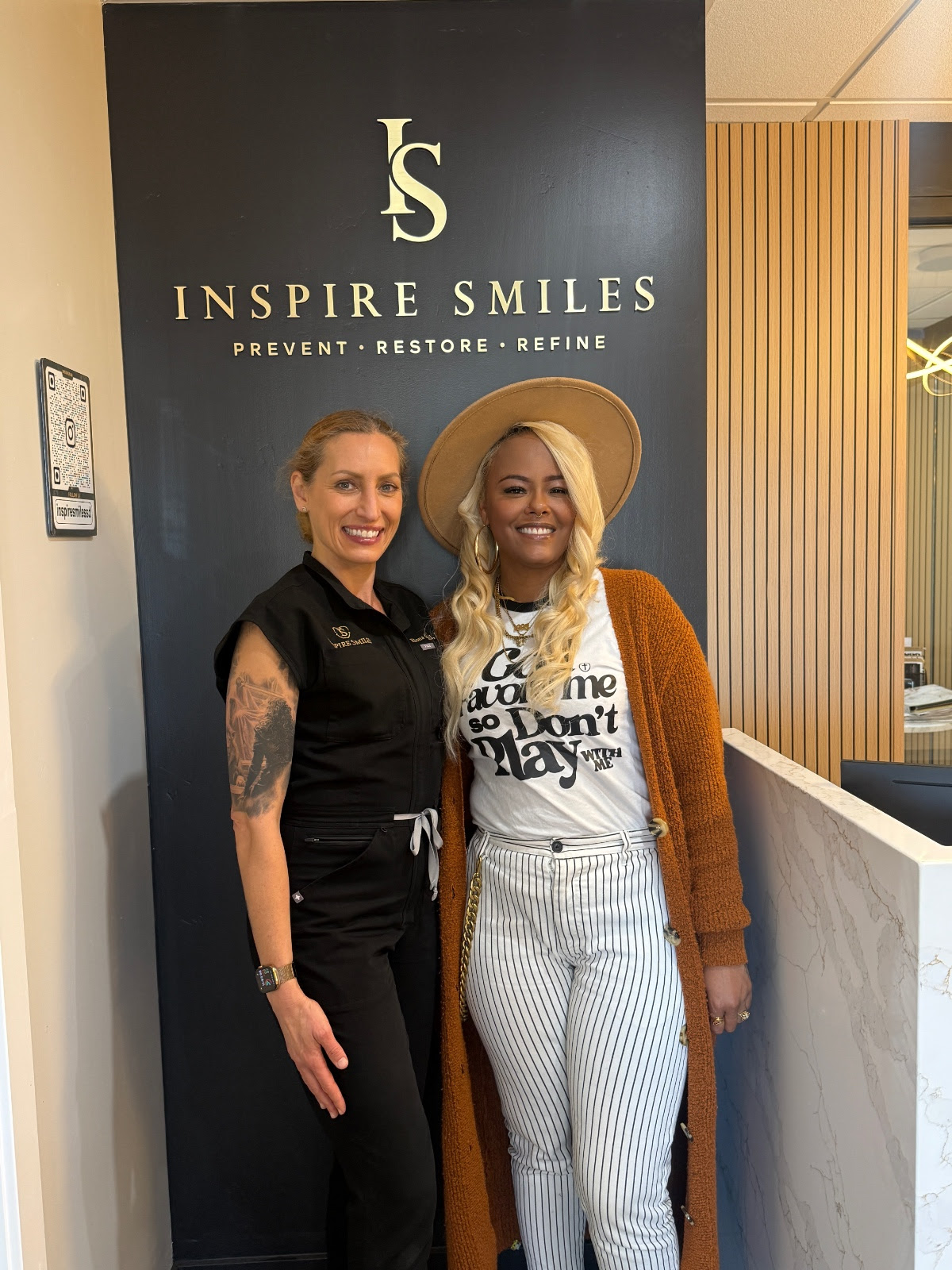The Inspire Blog

January 10, 2025
Welcome to Inspire Smiles
At Inspire Smiles, we believe in more than just treating teeth; we're committed to transforming lives through comprehensive dental care.
Read Post

February 1, 2026
Smile Makeover Results: What to Expect and How to Maintain Your New Smile
After investing in a smile makeover, understanding what results to expect and how to maintain them protects your investment for years to come. This guide covers realistic expectations for smile makeover outcomes, how long different procedures last, and the maintenance routines that maximize longevity. Learn what factors affect how long results endure, when touch-ups or replacements become necessary, and how daily habits impact your cosmetic dental work. From proper oral hygiene techniques to protective measures against damage, patients throughout Solana Beach, Del Mar, Rancho Santa Fe, and San Diego's North Coast can use this resource to ensure their smile transformation delivers lasting satisfaction.
Read Post

February 1, 2026
How Long Does a Smile Makeover Take? Timeline Guide for San Diego Patients
Understanding smile makeover timelines helps patients plan effectively for their transformation journey. Treatment duration varies significantly based on the procedures involved, ranging from a few weeks for simple enhancements to over a year for comprehensive reconstructions. This guide breaks down typical timelines for common smile makeover procedures, explains what factors influence treatment duration, and helps patients set realistic expectations. Learn how phased treatment approaches can accommodate busy schedules and why rushing comprehensive dental work often compromises results. Patients throughout Solana Beach, Del Mar, Rancho Santa Fe, and San Diego's North Coast can use this resource to understand what their smile makeover timeline might look like.
Read Post

February 1, 2026
What to Expect During Your Smile Makeover Consultation in Solana Beach
A smile makeover consultation represents the essential first step toward transforming your smile, providing an opportunity to discuss goals, evaluate oral health, and develop a personalized treatment plan. Understanding what happens during this appointment helps patients prepare effectively and maximize the value of their visit. This guide walks through each stage of the consultation process, from initial discussion through digital imaging and treatment planning. Learn what questions to ask, how to communicate your goals clearly, and what information to bring. Patients throughout Solana Beach, Del Mar, Rancho Santa Fe, and San Diego's North Coast can use this resource to approach their consultation with confidence.
Read Post

February 1, 2026
Porcelain Veneers vs. Dental Bonding: Which Cosmetic Option Is Right for Your Smile?
Choosing between porcelain veneers and dental bonding represents one of the most common decisions patients face when considering cosmetic dental treatment. Both options address similar concerns including chips, gaps, discoloration, and minor shape irregularities, yet they differ significantly in durability, appearance, cost, and treatment process. This comprehensive comparison helps patients throughout Solana Beach, Del Mar, Rancho Santa Fe, and San Diego's North Coast understand the advantages and limitations of each approach. Learn which option best suits different situations, what factors influence the recommendation, and how to discuss your specific needs during a cosmetic dentistry consultation.
Read Post

February 1, 2026
How Much Does a Smile Makeover Cost in San Diego and Solana Beach, CA?
Understanding smile makeover costs helps patients plan for transformative dental care. This comprehensive guide breaks down the investment required for various cosmetic procedures, from porcelain veneers and professional whitening to Invisalign and dental implants. Learn what factors influence pricing, how dental insurance applies to cosmetic treatments, and what financing options make smile makeovers accessible. Whether considering a simple enhancement or comprehensive reconstruction, patients throughout Solana Beach, Del Mar, Rancho Santa Fe, and San Diego's North Coast can use this educational resource to understand the range of costs involved before scheduling a personalized consultation.
Read Post

February 1, 2026
Smile Makeover in San Diego and Solana Beach, CA: A Complete Guide to Transforming Your Smile
A smile makeover combines multiple cosmetic and restorative dental procedures into a personalized treatment plan designed to transform the appearance of your teeth, gums, and overall smile. This comprehensive guide explores what smile makeovers include, from porcelain veneers and professional whitening to Invisalign and dental implants. Learn how the consultation process works, what timeline to expect, and who makes a good candidate. Discover why a wellness-focused approach that considers function, health, and aesthetics produces the most natural-looking, long-lasting results for patients throughout Solana Beach, Del Mar, Rancho Santa Fe, and San Diego's North Coast.
Read Post

January 12, 2026
Veneer Longevity in Coastal California: Evidence-Based Care for San Diego Smiles
Achieving long-lasting veneers in San Diego's coastal communities requires understanding the unique challenges of our environment. This evidence-based guide explores the science behind veneer longevity, examining how material science, expert bonding techniques, and proactive maintenance protocols work together to protect your smile investment. Learn how North County lifestyle factors—from saline air to recreational habits—impact dental restorations, discover year-by-year maintenance timelines, and get practical strategies for maximizing the lifespan of your porcelain or composite veneers through proper care and professional oversight.
Read Post

January 12, 2026
Veneer Costs & Financing in San Diego: A 2026 North County Market Analysis
Understanding the true cost of veneers in Solana Beach and North County San Diego requires more than just a per-tooth price. This comprehensive guide breaks down the 2026 pricing landscape, from material costs and laboratory fees to insurance realities and financing options. We explore porcelain vs. composite investments, analyze long-term value versus initial expense, and provide practical budget planning strategies for residents of Del Mar, Encinitas, Rancho Santa Fe, and surrounding communities. Learn how to navigate dental insurance coverage, access local financing pathways, and make informed decisions about your smile transformation investment in San Diego's coastal market.
Read Post

January 12, 2026
Veneer Longevity in Coastal California: Evidence-Based Care for San Diego Smiles
Discover how coastal living affects veneer longevity in San Diego's North County. This evidence-based guide examines how salt air, UV exposure, and active lifestyles in Solana Beach, Del Mar, Encinitas, and surrounding communities impact porcelain and composite veneer lifespans. Learn specific maintenance protocols for beachfront residents, climate adaptation strategies, and professional care recommendations to maximize your smile investment. Understand realistic lifespan expectations (10-15+ years for porcelain, 5-10 years for composite) with proper coastal care, plus signs indicating when replacement is needed versus repair. Get practical guidance tailored to North County's unique environmental factors and lifestyle patterns for optimal veneer performance and longevity.
Read Post

January 12, 2026
No-Prep & Minimal-Prep Veneers: Preserving Your Natural Tooth Structure in Solana Beach
Explore no-prep and minimal-prep veneer options in Solana Beach that preserve 90-100% of your natural tooth structure. This comprehensive guide explains candidacy requirements for North County residents, compares conservative approaches to traditional veneers, and details the preservation-focused philosophy behind these minimally invasive treatments. Learn how these options align with wellness values in Del Mar, Encinitas, Carmel Valley, and Rancho Santa Fe communities, including longevity expectations, maintenance requirements, and when traditional veneers might be necessary. Discover local case examples and consultation guidance for determining if conservative veneers suit your aesthetic goals and commitment to enamel preservation in San Diego's North Coast.
Read Post







.jpg)

.jpg)


.jpeg)
.jpeg)